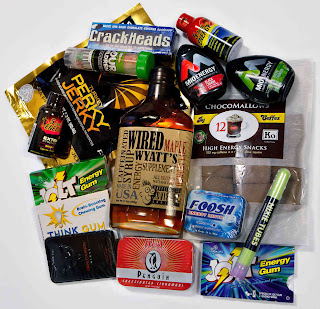Maria Abaca discusses findings that food manufacturers are
sneaking caffeine into more than just energy drinks. The Food and Drug
Administration is concerned about what this could mean for young
consumers. This new phenomenon, as well as the effects of too much
caffeine in the human body, are covered by Maria Abaca.
There is a new mania for caffeine-laced products. Items such as chewing gum, candy, and snack foods
are being processed with caffeine for the purpose of providing a fast energy
boost. However, the Food and Drug
Administration has not previously evaluated the safety of including caffeine in
food products, and has launched an investigation on the resulting health
effects on children and teenagers. [1]
The concern was born from the recent rash of
hospitalizations of children from the over-consumption of energy beverages, many
of which are very large in size (some over 24 ounces). These energy drinks boast of energy-raising
herbal ingredients, but it is the caffeine content that is found to be the real
cause enhanced feelings of alertness.
Chewing gum, marshmallows, candy, potato chips and brightly
packaged snack foods are by their very nature appealing to children. By incorporating caffeine into these treats,
processed food manufacturers are essentially including a potentially addictive
element into products that children are, frankly, better off without.
For growing children, it is best to limit the consumption of
processed snack foods and soft drinks, which offer negligible nutritional value
and are at the root of the nation’s obesity epidemic. The inclusion of caffeine could only
exacerbate the issue. Recent studies
have shown that insufficient sleep can cause the body to produce an excess of
stress hormones, causing a spike in blood sugar, effectively mimicking type 2
diabetes.
Additionally, sleep
deprivation raises the risk of heart disease, stroke and depression. Even though caffeine is not inherently
harmful (in moderation), consuming large amounts of caffeine in beverage or
food form before the body has had a chance to wind down for the night could
inhibit the ability to fall into a restful sleep.
By Maria Abaca
[1]
O’Connor, Anahad: Caffeine-Laced Foods Spur F.D.A. Investigation New York Times
5/3/2013 http://well.blogs.nytimes.com/2013/05/03/caffeine-laced-foods-spur-f-d-a-investigation/?ref=health
